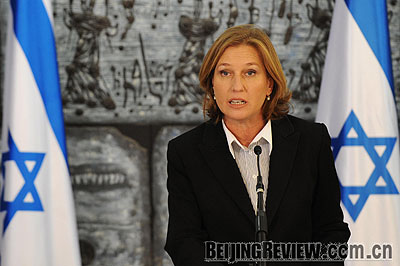|

STARTING OVER: Israeli Foreign Minister Tzipi Livni announced that she was unable to form a coalition government on October 26 in Jerusalem
Israeli Foreign Minister Tzipi Livni admitted her failure to form a new government on October 26, thrusting Israel into a complicated, uncertain transitional period.
Israel is scheduled to hold a parliamentary election on February 10 next year. As the winning party is unlikely to gain enough seats for a majority, it will need time to organize a coalition government. Therefore, the transitional period could be as long as six months. During this period, current Prime Minister Ehud Olmert, who resigned in September amid corruption allegations, will run a caretaker government. In the meantime, the United States will swear in a new president and Palestinian National Authority Chairman Mahmoud Abbas will finish his term. These transitions, together with the activities of Israeli political parties, will create a changing and complicated political situation inside Israel.
The parliamentary election mainly concerns two parties, the ruling Kadima party and Likud, the major center-right political party. The Knesset has 120 seats, out of which Kadima holds 29, the center-left Labor Party 19, and Likud 12. A recent poll showed that the Labor Party's approval rating is falling, while support for Likud is on the rise. After Olmert announced in July that he would not seek re-election as party leader, former Prime Minister Benjamin Netanyahu believed his Likud party would benefit from an early election and thus refused to join a Kadima-led coalition government. Livni worried that Kadima could lose its advantage in the Knesset if the election were held earlier. After she won the Kadima leadership election on September 18, Livni tried to establish a coalition government with the Labor Party and the Shas party, which would have made her prime minister. Negotiations stumbled, however, over the ultra-Orthodox Shas party's insistence that no compromise should be made on the status of Jerusalem. Livni had no choice but to agree to an early election.
Where the parties stand on the Middle East peace process will be a central issue in the election campaign. Kadima supports the Middle East peace process that resumed at the Annapolis Conference in the United States last year. At the conference, the Israelis and Palestinians agreed to a two-state solution and emphasized negotiation between the Israelis, the Palestinians and those from related Arab states to solve the Middle East conflict. Likud takes a harder stance. It stresses that Jerusalem is indivisible and refuses to negotiate with countries like Syria. It is possible that no party will win even one quarter of total parliamentary seats, putting the winning party in a weak position as it seeks to form a coalition government.
|
